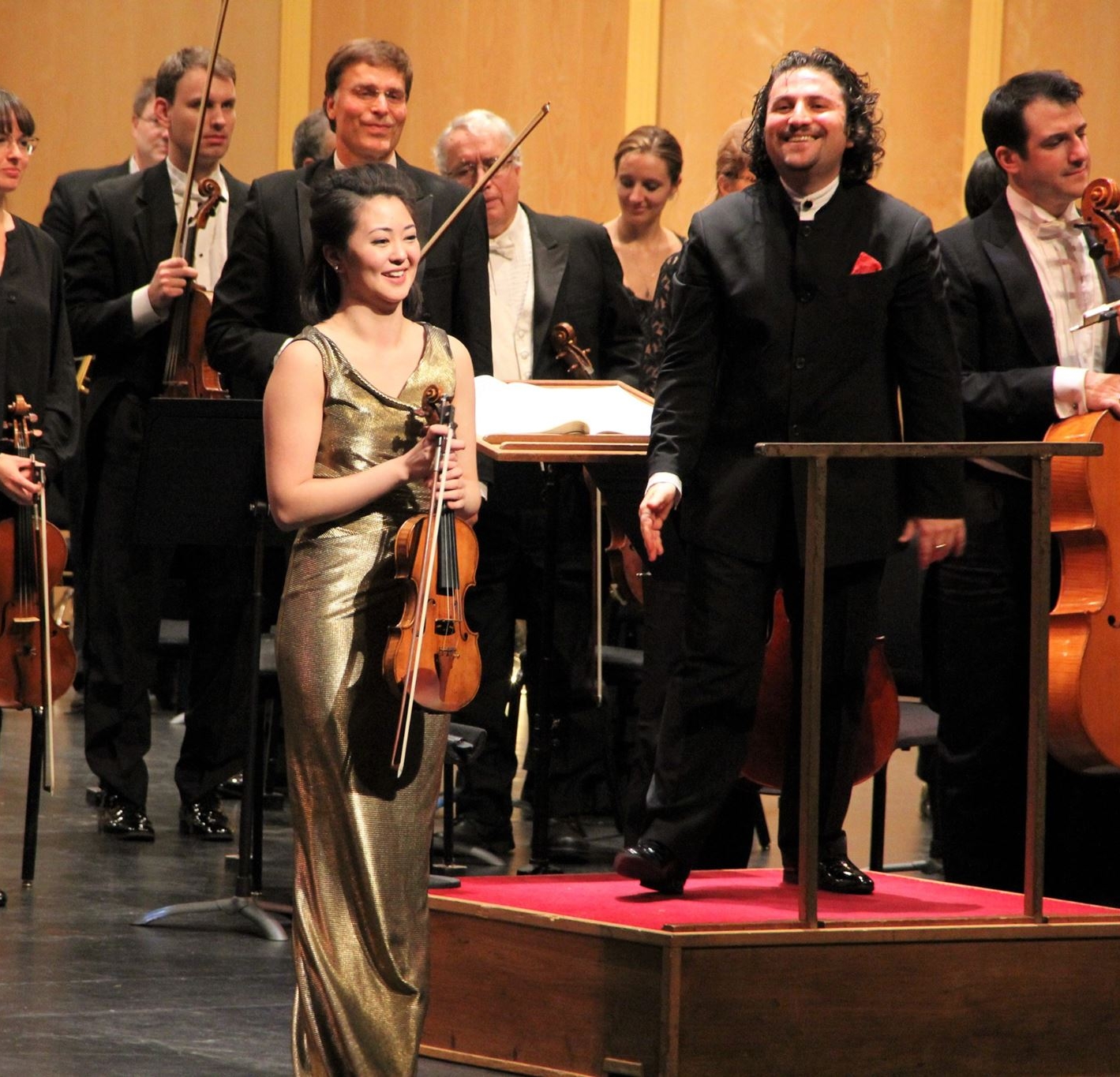CONDUCTOR MIKHAIL AGREST IMPRESSES WITH NATURAL MUSICALITY AND FEELING IN DVORAK AND TCHAIKOVSKY
Simone Porter, violin; VSO/ Mikhail Agrest: Works by Dvořák, Bruch and Tchaikovsky, Orpheum, December 3, 2016.
In witnessing the debuts of a number of less well-known young conductors this season, one also happens to run into one of the miracles of 21st century marketing: they all arrive with the same press clippings. They are all touted to be exciting and charismatic and all have brought the house down with their riveting power and display on numerous occasions. I wonder if these candidates would be less appealing if they had merely demonstrated a natural musicality that imbued their performances with authenticity and subtle insight. The reality is that this latter quality is the scarce resource, and just how often do we see it?
I had virtually no prior information about Mikhail Agrest, except that he was born in St. Petersburg, moved to America early, studied at Indiana, and then went back to Russia to study with the venerable Ilya Musin. While making appearances at both the Met and Covent Garden early on, he has apparently sharpened his skills more recently at the Mariinsky Theatre. He also has had success at the Semperoper, as well as with the other Dresden orchestras, and has been invited back to conduct both the London Philharmonic and Seattle Symphony. A Seattle Times review suggested that ‘he gave a performance of such inspired passion that the players were practically jolted out of their chairs. He conducted like a man possessed, as if lives depended on the outcome…’ Perhaps he did, but what impressed in this Vancouver Symphony debut was precisely his natural musicality and feeling, his ability to find subtle variety in his orchestral control without self-consciousness, and the reserve of strength that allowed him to pull the orchestra fully together when he needed to. There was an unaffected ease in both the music making and the orchestra’s execution that was distinctive.
In Dvořák’s Othello Overture that opened the concert, Agrest certainly might have found more weight and emphasis at the work’s climaxes (particularly the decisive timpani) but otherwise he gave a particularly atmospheric and idiomatic performance. Starting from pianissimo strings and soft, mysterious woodwinds (not something we hear that often), the overture blossomed with natural flow and feeling, a plasticity informing its lyrical phrases and many bucolic touches popping up along the way. Not quintessentially dramatic, but always meaningful and always generating a coaxing romantic line and intensity: I found myself thinking about the fabric of the classic Czech Philharmonic performances in the days of Karel Ančerl and others. I was also impressed with how patient the conductor was in establishing soft atmospheric textures with suspension and feeling, a trouble spot for many young conductors.
The orchestral sound that Agrest achieved in the climaxes of the Bruch Violin Concerto was likely rounder and more imposing than in the overture, and he displayed fine sensitivity in softer passages too. Unfortunately, his collaboration with Seattle sensation Simone Porter did not work out that well. Perhaps the young violinist was too eager to dig in to this concerto in a big way but, for all her attack and tonal luster, she failed to establish either a very clear expositional line or a convincing intimacy in her expression. There were some lovely moments for sure but, overall, she tended to push phrases around a lot, trying too hard for dramatic emphasis. This cost her technical poise at times, but the other liability was that the softer musings of the first two movements – taken at exceptionally slow tempos – came out as so sentimental. Perhaps this heart-on-sleeve musing might have fit the more fragile moments of the Elgar concerto, but it looked overdone in the context of the Bruch. The finale was somewhat better, but still remained more grounded and stressful in the violin part than it should be.
Such is the demand for ultra-popular Tchaikovsky these days that many very well-known orchestral works by the composer are just not performed at all. When was the last time that I heard the complete Orchestral Suite No. 3? This work once gained legendary fame for its ‘Theme and Variations’ but I have not heard even that movement in concert for years. It is altogether delightful music, imbued with both feeling and playfulness, with the elegance and caprice of the Russian Imperial Court – and indeed the ghost of Mozart – always present. For the most part, Agrest conducted a lovely performance, full of ambient feeling and flow.
The natural ease and breadth in the string phrasing was apparent in the opening Elegy, capturing a distinctly Tchaikovskian beauty. The winds in the Scherzo bubbled forth with just the right delight, while the variety in the Theme and Variations was mined with true Russian sensibility. The variations built with inevitability, displaying uncommon string unanimity throughout, and finding real power (and wonderfully clear and separated brass) at the end. Visiting Concertmaster Eli Matthews negotiated all the violin solos with poise and enticing tone. What I liked about this conducting is that it all seemed so easy: the uniquely-Russian power of the ending seemed simply like a natural outgrowth of what came before. Yes, it was exciting, but there was no special effort to make it so. The only qualification might be in the earlier Melancholy Waltz, where the orchestra did not find its rhythmic pull with the best discipline and solidity: the oxcart being moved is really heavy and one should feel this.
This is one of the finest young conductors we have seen so far.
© Geoffrey Newman 2016

